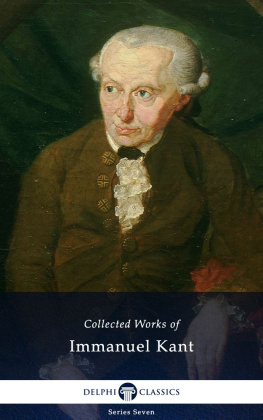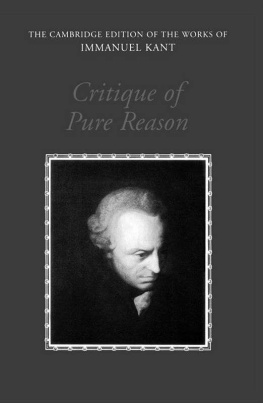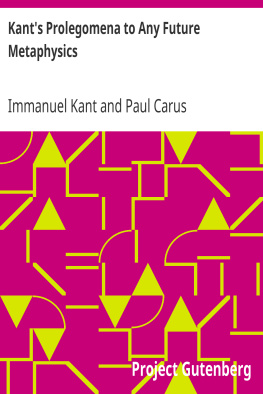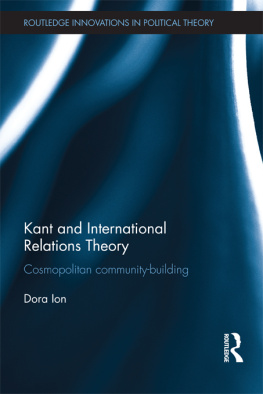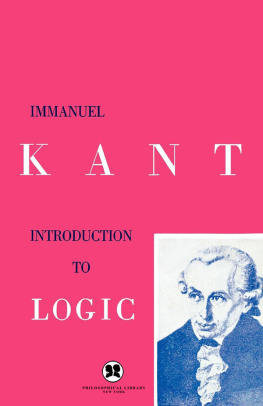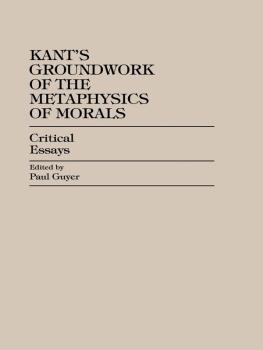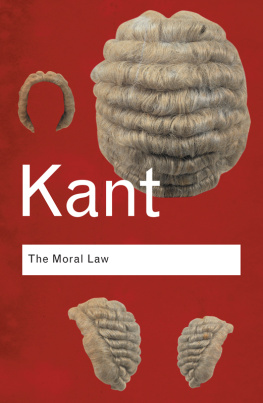Rethinking the Western Tradition
The volumes in this series seek to address the present debate over the Western tradition by reprinting key works of that tradition along with essays that evaluate each text from different perspectives.
Groundwork for the Metaphysics of Morals
[Ak 4:385]
EDITORIAL
COMMITTEE FOR
Rethinking the Western Tradition
David Bromwich
Yale University
Gerald Graff
University of Illinois at Chicago
Geoffrey Hartman
Yale University
Samuel Lipman
(deceased) The New Criterion
Gary Saul Morson
Northwestern University
Jaroslav Pelikan
Yale University
Marjorie Perloff
Stanford University
Richard Rorty
Stanford University
Alan Ryan
New College, Oxford
Ian Shapiro
Yale University
Frank M. Turner
Yale University
Allen W. Wood
Stanford University
Groundwork for the Metaphysics of Morals
IMMANUEL KANT
Edited and translated by Allen W. Wood with essays by
J. B. Schneewind
Marcia Baron
Shelly Kagan
Allen W. Wood

Published with assistance from the Ernst Cassirer Publications Fund.
Copyright 2002 by Yale University.
All rights reserved.
This book may not be reproduced, in whole or in part, including illustrations, in any form (beyond that copying permitted by Sections 107 and 108 of the U.S. Copyright Law and except by reviewers for the public press), without written permission from the publishers.
Printed in the United States of America by
Vail-Ballou Press, Binghamton, New York.
Library of Congress Cataloging-in-Publication Data
Kant, Immanuel, 17241804.
[Grundlegung zur Metaphysik der Sitten. English]
Groundwork for the metaphysics of morals/Immanuel Kant ; edited and translated by Allen W. Wood ; with essays by J. B. Schneewind .. [et al.].
p. cm.(Rethinking the Western tradition)
Includes bibliographical references and index. ISBN 0300094868 (cloth)ISBN 0300094876 (paper) 1. EthicsEarly works to 1800. I. Wood, Allen W. II. Schneewind, J. B. (Jerome B.) III.
Title. IV. Series.
B2766.E6 W6613 2002
170dc212002002605
A catalogue record for this book is available from the British Library. The paper in this book meets the guidelines for permanence and durability of the Committee on Production Guidelines for Book Longevity of the Council on Library Resources.
10 9 8 7 6 5 4 3 21
Contributors
J. B. Schneewind is professor of philosophy (emeritus) at Johns Hopkins University.
Marcia Baron is professor of Philosophy at Indiana University.
Shelly Kagan is Henry R. Luce Professor of Social Thought and Ethics at Yale University.
Allen W. Wood is Ward W. and Priscilla B. Woods Professor at Stanford University.
Contents
Text
Essays
1. Why Study Kants Ethics?
J. B.
2. Acting from Duty
Marcia
3. Kantianism for Consequentialists
Shelly
4. What Is Kantian Ethics?
Allen W.
Editors Preface
Kants little book of 1785 is one of the most significant texts in the history of ethics. It has been a standard of referencesometimes a model to be developed and expanded on, sometimes a target of criticismfor moral philosophers from the German idealist and German Romantic traditions, for Victorians of the utilitarian school such as Mill and Sidgwick, for later British idealists such as Green and Bradley, for the neo-Kantians, for twentieth-century philosophers in both the continental and the anglophone traditions, and for moral philosophers of all persuasions right down to the present day. From the standpoint of the depth and originality of the ideas it contains, it undoubtedly deserves this influence. But in the development of Kants own moral thinking, it occupies a place that ought to make us question the wisdom of treating it, the way moral philosophers customarily do, as the definitive statement of Kants views on ethics.
Kant first gave notice of his intention to produce a system of moral philosophy under the title metaphysics of morals about 1768. It took him eighteen years to deliver even the first installment of the promised system, which he gave a title indicative of the tentativeness and incompleteness of what he thought he had so far accomplished: he was only laying the ground for a metaphysics of morals by seeking out and establishing its first principle.
Kant apparently began composing the Groundwork late in 1783. Letters written by Kants brilliant but eccentric friend J. G. Hamann report that he began writing about moral philosophy in order to provide an anticritique of Christian Garves 1783 book on Ciceros treatise On Duties. But according to Hamann, during the spring of 1784 this critical discussion of Garve on Cicero was transformed into something quite different, a Prodromus der Moral (Ak 4:62628). The title Grundlegung zur Metaphysik der Sitten is first mentioned in a letter from Hamann in September 1784.
Hamanns correspondence reveals him to be an avid Kant-watcher, sometimes a helpfully critical one. But there is reason to be skeptical about his account of the genesis of the Groundwork. Hamanns account has inspired scholars as reputable as Klaus Reich and H. J. Paton to seek in the Groundwork for allusions to Cicero, and even to think that they have found them. But there are no explicit references either to Cicero or to Garves book about him. Kant may have been drawn to the subject of ethics in part by reading and reflecting on Garves book or Ciceros classical treatise, but it seems unlikely that the Groundwork, as we now have it, could have grown out of a critical discussion of Garve on Cicero. The Prodromus der Moral would seem to be a project independent of any anticritique of Garve that Kant could have been undertaking.
Kant was working on other topics in 1784 whose affinity with the ethical theory presented in the Groundwork is also worth noting. For instance, he was reviewing Herders Ideas for the Philosophy of History of Humanity and writing two other short essays, Idea for a Universal History from a Cosmopolitan Standpoint and Answer to the Question: What Is Enlightenment? that reflect on human history, the social sources of the evil in human nature, the role of autonomous reason in directing our lives, and the rational prospects for the moral progress of the human species. But perhaps no special explanation is needed for the fact that Kant finally got around to addressing a subject he had been promising to write on for the past sixteen years.
Whatever the actual history of its genesis, the Groundwork went into press with Johann Hartknoch of Riga late in 1784. Throughout the winter, and into the spring of 1785, Kants followers waited impatiently for its appearance (Ak 4:628). Apparently the first copies were available on April 7. A second edition, altered in a number of passages throughout (but never very greatly in any of them), appeared in 1786. This second edition went through six more reprintings during Kants lifetime.
Kant seems always to have treated the Groundwork as a successful laying of the ground for the ethical theory presented in his later writings. But clearly he soon came to regard it as not providing a complete or wholly clear presentation even of the foundations of his system, for only three years later he wrote a Critique of Practical Reason
Next page


